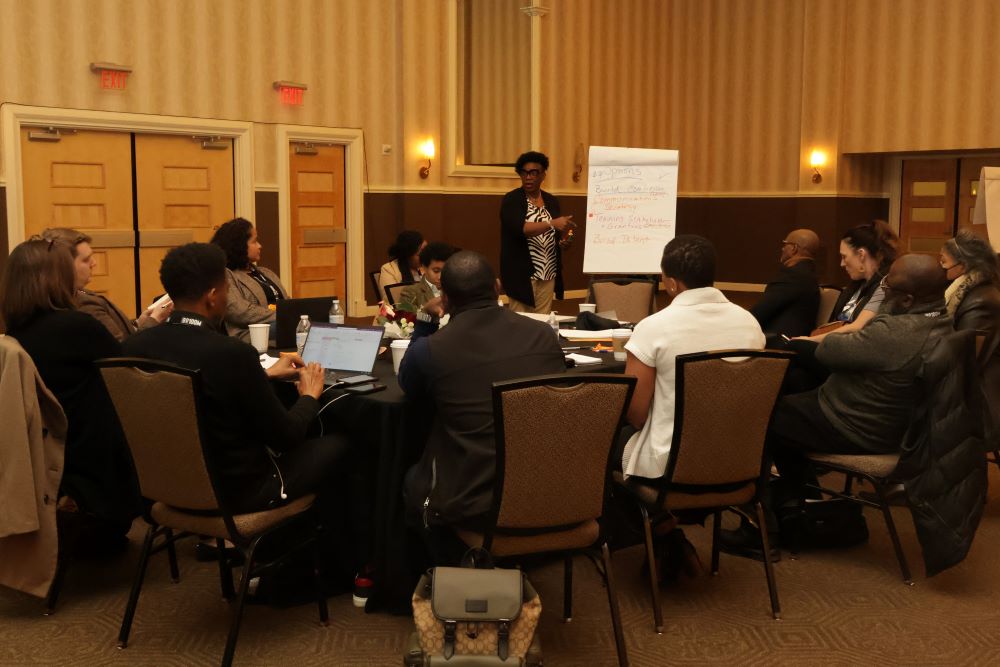Next week, DC’s Bank on 100 Million Coalition from Mission: Launch and the Department of Employment Services will host a hackathon on supporting employment for returning citizens.
The Future Ready Now: DC Hackathon will take place on April 13 and 14, with representatives from the Department of Labor and other federal agencies. During the two-day event, stakeholders will convene to discuss reentry and professional pathways for people that were incarcerated.
Mission: Launch president and CEO Teresa Hodge, who’s also the creator of R3 Score, founded both companies after her own experience of incarceration. She told Technical.ly that she works with both entities to make sure that a prison sentence doesn’t have to ruin someone’s life or eviscerate their human dignity.
Now, she told Technical.ly, is an ideal time to reexamine pathways and see how companies can best support returning citizens.
“We think it’s important that we create a pathway of opportunity, especially in a post-COVID world,” Hodge said. “While corporations aren’t just thinking about the future of work — they’re rebuilding their models — now is the time for us to create new solutions.”
Day 1 will begin with a welcoming ceremony and individuals presenting what they’re working on and what they want to solve to the group. Following that, participants will tune in to a fireside chat on funding innovation and networking. On Day 2, attendees will break into groups and look to solve some of the issues returning citizens experience when seeking to find work.
Hodge found the Department of Labor’s participation especially exciting because enabling job access in that department would open the doors for employment in other government agencies. A major challenge for many returning individuals, she said, is that the isolation of incarceration freezes them out of job training.
“The hard part is, for a lot of people who are incarcerated: They are part of a digital desert, so they don’t have access to computers,” Hodge said. “If they do have access to computers and technology, they don’t have access to all of the ways they need to learn and train and retool for upskilling.”
According to Hodge, the tech industry is relatively welcoming to those with records. If they have the chance, these jobseekers can return home and upskill locally or online, take tech certification tests and move forward. But since not everyone has the time or funds for that, she’d like to see more options for people to learn and complete training while they’re incarcerated so they return ready to take the test or apply for a job.
“As a person who was imprisoned, what I know is, you have a tremendous amount of time,” Hodge said. “The best way to maximize that time is through learning so that people come home and they’re ready.”
Hodge hopes participants can develop solutions to close the digital divide for those with arrest records. She’d also like to see tech companies come to the event and find the best way to reach and support returning citizens with the jobs they need to fill.
Aventiv, a sponsor of the event, is a tech company that works to end digital deserts in prisons and boost access to devices. Margita Thompson, chief communications and community engagement officer for the company, said that it also hires returning citizens and works with an organization that trains formerly incarcerated women in customer services.
She added that companies need to seriously consider this population when hiring because 100 million Americans are expected to have experienced incarceration by 2030.
“To turn off a pool of talent at a time when we should be tapping into different experiences to meet the needs of society is a mistake,” Thompson said.
All of this, Hodge added, is particularly crucial to make sure that returning citizens are not defined by their incarceration experience.
“We think, quite frankly, pretty low of this population,” Hodge said. “We think of their worst possible mistake. And what we know is all of us are better than our worst mistake and none of us want to be judged by our worst mistakes for the rest of our lives.”







